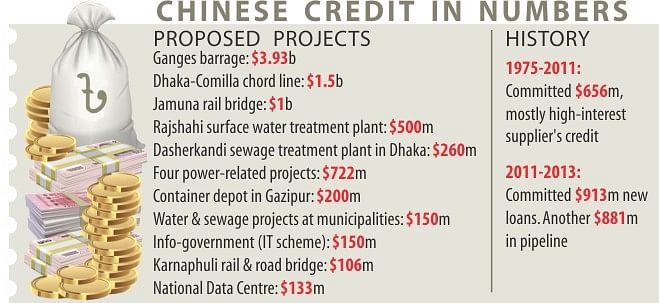Beijing, help build
Beijing, help build
Govt seeks China deal for mega infrastructure projects

Going strong with China economically and politically, Bangladesh is seeking a deal of $8.6 billion Chinese soft loan for 14 infrastructure projects that include the massive Ganges barrage.
The other important projects include a rail bridge over the Jamuna river and a high-speed “chord” train line between Dhaka and Comilla, officials of the Economic Relations Division have told The Daily Star.
Side by side, the government has given green signal for a Chinese proposal to fund and build a multi-lane tunnel under the Karnaphuli river at a cost of $700m. This was decided by the Prime Minister's Office following an inter-ministerial meeting organised by the finance ministry last month.
Also, the government in principle has decided to respond to a proposal to build an exclusive economic zone for China on a thousand acres of land by the Karnaphuli. China is very interested in this zone as its labour cost has gone up significantly and it wants to shift some industries here.
Dhaka, however, is indecisive on China's $5 billion proposal to build a deep-sea port near Sonadia island because it has also got proposals from several other countries including India, Germany, Denmark and the UAE.
According to finance ministry officials, Beijing has recently called upon Dhaka to sign a Memorandum of Understanding (MoU) with China Harbour Engineering Company Ltd for the deep-sea port.
China had remained a low-key development partner till 2011. But in the last three years, its financial support surged significantly, with low interest rates.
In addition, it asked Bangladesh to prepare a set of projects that China can invest over the next five years. The set of 14 projects was identified accordingly with a proposed interest rate of 1.5 percent and repayment period of 20 years.
A finance ministry official told this correspondent yesterday that the 14 projects were handpicked by Finance Minister AMA Muhith upon compiling a long list of various projects from different ministries.
Beijing would inform Dhaka for which projects it would finally provide loans.
Of them, the $3.93billion Ganges barrage scheme is all set for implementation if funding is ensured. Its feasibility study has been done in 2009.
By building a barrage in the Ganges system in Rajbari, the country can stop salinity creeping in the southwestern region as well as reap a net benefit of Tk 7,340 crore every year.
After the barrage is built, about 52 lakh hectares of land could be brought under cultivation under different agricultural projects. A total of 113 megawatts of hydroelectricity can be generated at the main barrage and an off-track structure in the river Gorai.
Another costly project is construction of $1.5billion Dhaka-Comilla Chord Rail Line that will ease population pressure in the capital to a great extent. Unlike conventional rail tracks, chord rail line is a straight line -- void of any curves -- allowing fast movement of the trains.
Another project envisaged under the loan is a 4.8km long dual-gauge double-track rail bridge -- parallel to the Bangabandhu Jamuna Bridge -- at a cost of $1 billion. The Asian Development Bank is financing its feasibility study, now in progress.
Eleven more projects involving $2billion include improvement of power transmission system, setting up two water and sewerage treatment plants and National Data Centre.
Though the new Chinese loan will be soft in nature, it will have a condition under which only Chinese companies would implement the projects.
THE CHINESE CONNECTION
Explaining why China has suddenly taken so much interest in Bangladesh, the lead economist at World Bank's Dhaka office, Zahid Hussain, said, “China has very large trade surplus which it has been investing in building US treasury bills for a long time. The US, a safe haven for foreign funds, is now cutting its public sector borrowing requirement.”
“Surplus countries such as China therefore are looking for alternative places for investing their funds in opportunities that are profitable while the associated risks are manageable.
“Bangladesh certainly deserves consideration for longer term placement of funds at the government-to-government level in projects that can make a large difference in our economic progress,” he said.
“What will be important from the Bangladesh point of view in making such deals is to comprehensively assess the costs of such funds, including both the explicit costs such as interest and commitment fees and the implicit costs such as conditions on procurement of goods, works and services.”
According to a finance ministry official, as Bangladesh aims at becoming a middle income country by 2021, it highly needs investment in infrastructure sector to increase growth.
“This is why, the government high-ups went to China several times asking for more investment. China is now reciprocating,” he added.
Besides, India's offer of $1 billion loan to Dhaka in 2010 also prompted China to think how it could play a greater role in Bangladesh, which is a big market now.
The more investment Beijing pumps in Bangladesh, the more its business interest here would be served.